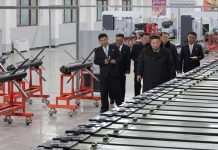DM Monitoring
BULBOACA: The presidents of Serbia and Kosovo insisted on Thursday they want to defuse a violent crisis in northern Kosovo but showed little sign of backing down from their opposing positions.
Arriving at a summit in Moldova of more than 40 European leaders, Serbia’s Aleksandar Vucic and Kosovo’s Vjosa Osmani did not acknowledge each other even as they stood just metres apart on the red carpet.
Both sides are under international pressure to resolve the latest in a long line of crises between Kosovo’s ethnic Albanian-dominated government and ethnic Serbs who are a majority in the north.
Violence flared on Monday after Kosovo authorities, backed by special police units, installed ethnic Albanian mayors in offices in northern municipalities. The mayors had been elected on turnout of just 3.5% after Serbs boycotted local polls.
Osmani said Belgrade was trying to destabilise Kosovo as it had failed to come to terms with Kosovo’s 2008 declaration of independence from Serbia.
“We all understand that the real threat in fact is coming from Serbia’s denial of Kosovo’s existence of a sovereign state,” Osmani said.
She accused Vucic of backing criminal gangs in northern Kosovo, which she said were ultimately responsible for clashes that wounded 30 NATO peacekeeping troops and 52 Serb protesters.
“President Vucic needs to stop supporting criminal gangs in Kosovo. That’s what he needs to do if he truly wants peace. He’s yet to show that,” she said.
Serbia has rejected that accusation. As he arrived at the summit at a castle in the Moldovan countryside, Vucic was less forceful than Osmani in his rhetoric.
But he said Kosovo authorities should withdraw “alleged mayors” from the north and declared the Kosovo special police units were there illegally.
“Serbia will do its best and its utmost to de-escalate the situation, which means that we’ll try to persuade Serbs to progress calmly and peacefully,” he said.
“They’re very determined,” he added. “They want to see the back of the special police units.”



